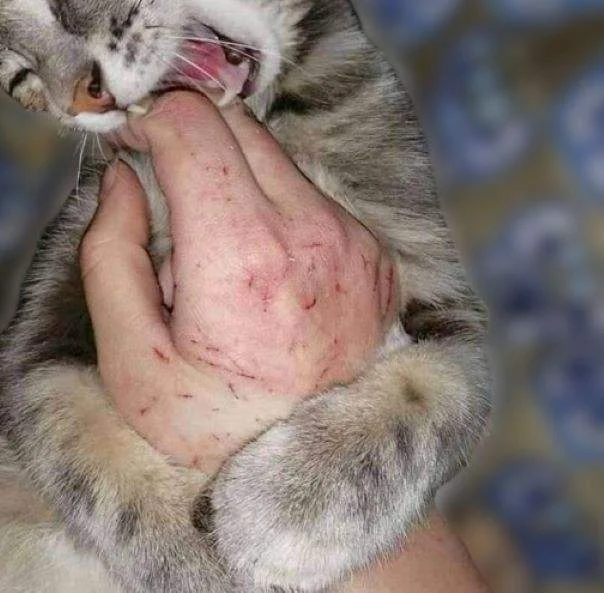Dr Bruce Fogle in his book 'Complete Cat Care' makes a statement which caught my attention: "Cats are naturally aggressive". We don't think of it like that very often. But it is true. And it is a source of potential trouble in the human-to-cat relationship.
Despite the beautifully relationships between cats and their caregivers all over the world, the domestic cat is a top predator armed with weapons: claws and teeth.
And they like to use them in play because play for domestic cats is play-hunting. All play is centred around hunting and hunting employs sharp canine teeth and even sharper claws on their forepaws.
They are programmed to hunt and kill. It is their major activity in life. And we know how cats act on instinct. This makes their genetic programming more effective as it is not tempered by rational thought.
 |
| Man used hand as a cat toy. Bad idea. Image in public domain and modified by MikeB. |
Sometimes a cat caregiver can become annoyed and emotionally hurt by their cat as they feel that they've been respectful and gentle with them only to be scratched or bitten in return.
Perceived behavioural problems can lead to a breakdown in the relationship and the surrender of the cat at a rescue centre or to a neighbour. Aggressive behaviour is in the top 10 reasons for giving up a cat. Understanding the deep emotional need to be aggressive for cats helps to restore the relationship.
The classic form of feline aggression that pops up from time to time is the 'love bite'. It sounds innocent and loving but the cat love bite is not the same as the human version. We know that.
Another description of 'love bites' is 'petting aggression'. Your cat is relaxed and enjoying your company. You gently pet your cat without thinking too much about how you are doing it and wham, your darling cat companion crunches down on your hand with her sharp canine teeth while holding on with the forepaws.
To release from this uncomfortable situation, distract your cat with the free hand and in that window of opportunity release the trapped hand slowly. Or use the free hand to scruff your cat's neck and then release the other.
RELATED: 11 types of domestic cat aggression and how to resolve them.
Cats' teeth are designed to pierce the skin and break the spinal cord of prey animals. Stroking triggers mixed emotions. Domestic cats enjoy touching their human caregiver and other pets normally.
My cat likes to reach out with his paw to touch my hand when he is with me. They like to be physically connected with their human companion, but they can become worried by it because the domestic cat's adult wildcat ancestor does not make physical contact with others except to mate and fight (normally).
Although community cats and domestic cats form friendships and can rest together in close contact. But there is a different relationship between cat and human. And there is a big size difference which can work against the relationship. Humans can be intimidating to cats.
When a domestic cat becomes 'emotionally confused' during petting, as Bruce Fogle describes it, they may start to become instinctively aggressive.
Human caregivers need to spot the signs of feline irritation such as a flicking tail and a tenseness developing in the cat's face and general demeanour. Your cat is warming up for an aggressive act by our standards. Not hers. It is play but all cat play is aggressive.
For people it is all about understanding cat behaviour and respecting it. All feline aggression in the home towards humans can be avoided and should be avoided by reading cat body language and understanding feline behaviour and their deep-seated instincts inherited from their wild cat ancestor which are just below the surface.



No comments:
Post a Comment
Your comments are always welcome.
Note: only a member of this blog may post a comment.